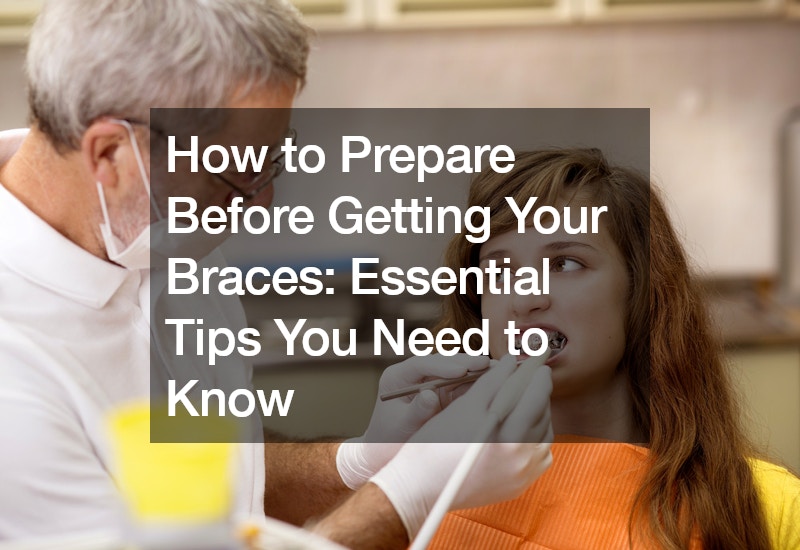
Disclaimer: This website provides health information for educational purposes only and is not a substitute for professional medical advice, diagnosis, or treatment. Always seek the guidance of a qualified healthcare provider with any questions you may have.
Deciding to get braces is a big step toward achieving a healthier, straighter smile. However, before you embark on your braces journey, it’s essential to make sure you’re fully prepared. By taking some necessary steps beforehand, you can ensure a smoother experience and set yourself up for success. Here are some essential tips to help you prepare before getting your braces:
Schedule a Dental Cleaning:
Before your braces appointment, it’s a good idea to visit your family dentist for a thorough dental cleaning. Your orthodontist may even require it to ensure your teeth are in optimal condition before applying braces.
A clean mouth not only promotes better oral health but also ensures that your braces will adhere properly to your teeth.
Stock Up on Lip Balm:
During the process of getting braces, your orthodontist may use techniques that require your lips to be dry. This can lead to dry, chapped lips, causing discomfort during and after the appointment. To alleviate this, bring along some lip balm or chapstick to keep your lips moisturized throughout the procedure.
Invest in Orthodontic Wax:
After getting your braces, it’s common to experience some discomfort as the brackets and wires may rub against the inside of your mouth. To ease this discomfort, consider investing in orthodontic wax. Applying a small amount of wax to the areas where the braces are irritating your mouth can provide much-needed relief.
Adjust Your Diet:
Braces can impact what you can eat, so it’s a good idea to adjust your diet accordingly. Avoid sticky and hard foods that can damage your braces, and opt for softer options instead. Cutting your food into smaller, bite-sized pieces can also help prevent any damage to your braces while eating.
Prepare for Soreness:
After getting your braces, it’s normal to experience some soreness as your teeth adjust to the pressure from the wires. Over-the-counter pain relievers can help alleviate this discomfort, so be sure to have some on hand. Additionally, eating before your appointment can give you some relief from soreness afterward.
Anticipate Changes in Speech:
Braces may temporarily affect your speech as you adjust to the feeling of having them in your mouth. This is normal and usually resolves itself over time as you become more accustomed to wearing braces. However, be prepared for some minor changes in speech initially.
Focus on Oral Hygiene:
With braces, it’s more important than ever to maintain good oral hygiene. Braces can make it more challenging to brush and floss effectively, so be sure to pay extra attention to your oral care routine. Consider using tools like a proxabrush to clean between brackets and wires.
Expect Regular Appointments:
Getting braces marks the beginning of a treatment journey that will involve regular adjustment appointments with your orthodontist. These appointments are crucial for monitoring your progress and making any necessary adjustments to your braces. Be prepared to attend these appointments every few weeks throughout your treatment.
Understanding Treatment Duration:
Braces treatment duration varies depending on individual needs and the complexity of your case. It’s essential to have realistic expectations about how long your treatment may take. Your orthodontist can provide an estimated timeline and discuss what to expect throughout the process. Knowing the duration of your treatment can help you stay motivated and committed to achieving the best results.
Preparing for Lifestyle Changes:
Getting braces often means adjusting your daily habits and activities. It’s essential to be prepared for these changes to ensure a smooth transition. Tips on maintaining oral hygiene, adapting your diet to braces-friendly foods, and managing discomfort can be invaluable. Understanding how braces may impact activities like playing sports or playing musical instruments can also help you plan accordingly.
Communication with Your Orthodontist:
Effective communication with your orthodontist is key to a successful braces journey. Before starting treatment, make sure to discuss any concerns or questions you have. Your orthodontist can provide valuable information about the process, address any doubts, and offer personalized advice based on your dental health. Clear communication will help alleviate anxiety and ensure you feel confident and informed every step of the way.
Emergency Care and Maintenance:
While braces are generally durable, occasional issues like loose brackets or poking wires may arise. Knowing how to handle these situations can prevent discomfort and ensure your treatment stays on track. Your orthodontist can provide guidance on how to address common issues at home and when to seek professional help. Being prepared for emergencies will give you peace of mind throughout your braces journey.
By following these essential tips and adequately preparing before getting your braces, you can ensure a smoother experience and set yourself up for success on your journey to a straighter, healthier smile.
.
